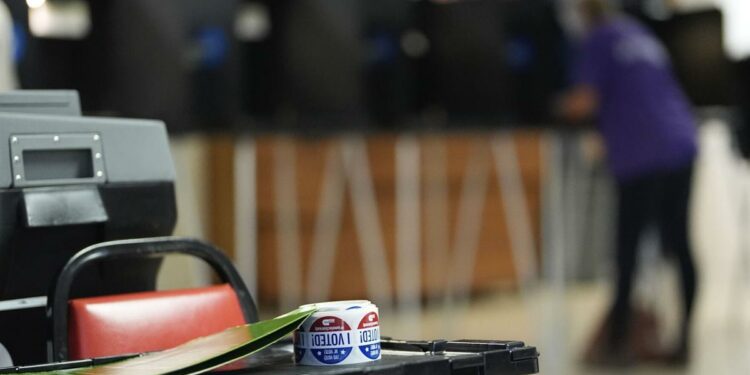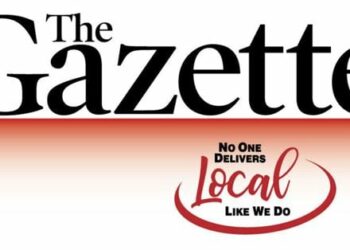Secretary of State Jena Griswold officially certified the 2024 election ballot on Sept. 10, which includes 14 statewide ballot measures.
The legislature referred to half of the constitutional amendments and propositions, while citizens initiates the rest.
Proposals that seek to change the Colorado Constitution require 55% of the voter to pass, while statutory measures require a simple majority. A quick note on the language: Propositions are statutory changes; amendments are constitutional changes.
Here are the measures referred to the ballot by the legislature.
Amendment G
This measure expands the eligibility for the homestead exemption — a property tax deduction — for veteran homeowners with a disability who are determined to be unemployable because of that disability and as determined by the U.S. Department of Veterans Affairs.
No issue committees are registered for or against the measure.
Amendment H
This measure establishes an independent judicial discipline adjudicative board, set standards for judicial review of a discipline case, and clarify when discipline proceedings become public. The measure came out of calls in 2022 and 2023 for changes in the judicial discipline process after reports showed a substantial increase in the number of complaints about judges, most of which were dismissed by the state’s judicial commission for lack of jurisdiction, as well as concerns about a lack of transparency around the judicial discipline process.
No issue committees are registered for or against the measure.
Amendment I
This measure makes those charged with first-degree murder ineligible for bail.
No issue committees are registered for or against the measure.
Amendment J
This measure overturns Amendment 43, adopted by voters in 2006, that banned same-sex marriage. The 2006 initiative was proposed by then-Lt. Gov. Jane Norton and her husband, former U.S. Attorney Mike Norton, and was approved on a 55% to 45% vote.
However, Amendment 43 was deemed null after the U.S. Supreme Court ruled in favor of same-sex marriages in Obergefell v. Hodges in 2015.
Freedom to Marry Colorado is an issue committee registered to support Amendment J. So far, the committee has raised nearly $341,000 to support the measure, with funding coming primarily from One Colorado Education Fund, the Rose Community Foundation and the Marriage Defense Fund of the Amalgamated Foundation of Washington, D.C.
The latter manages more than 150 donor-advised and collaborative funds for progressive causes and was spun off from Amalgamated Bank, partly owned by Service International Employees Union (SEIU), which is affiliated with Colorado WINS, the state employee union.
These groups do not report donor contributions.
No issue committee has yet been registered to oppose Amendment J.
Amendment K
This measure adds an extra week for some specific election deadlines. That includes changing, from three months, to three months and one week the deadline for filing initiative petitions with the Secretary of State one week before the election. It also changes from 90 days to 83 days the deadline for referendum petitions that challenge laws adopted by the General Assembly and gives judges and justices an extra week to file their intent to run for office.
No issue committees are registered for or against the measure.
Proposition JJ
This measure basically “de-Bruces” the state’s sports betting tax revenue, allowing the state to retain and spend all it collects. Under the measure, the state would use the first $29 million in revenue to regulate sports betting and pay for gambling programs. Any revenue over that would go to the state’s water plan implementation cash fund for water conservation and protection projects.
Voters approved Proposition DD in 2019, setting a 10% tax on sports betting proceeds. In 2022, the state collected $25.6 million from those taxes, more than double the amount collected the previous year. In 2023, revenues exceeded $27 million. According to Water Education Colorado, more than $60 million has been put toward water projects.
The fiscal note on HB24-1436 estimates revenues will exceed $30 million annually beginning in 2023-24.
The issue committee Yes on JJ has raised nearly $500,000 to support the measure. Funders include the Colorado Cattlemen’s Association, the Environmental Defense Action Fund and Conscience Bay Research. Conscience Bay provides grants to the Colorado Cattlemen’s Land Trust, Conservation Colorado, the Colorado Water Trust and others for climate-related projects in agriculture and Colorado River basin activities.
None of the groups reported funders’ information, although the Environmental Defense Fund and its affiliates receive funding from the Walton Foundation, which supports a number of water-related projects, as well as support for water reporting with news organizations in Colorado.
No issue committee has yet been registered to oppose Amendment J.
Proposition KK
This measure, which won no Republican votes and garnered some Democratic opposition, imposes an excise tax on firearms and ammunition, effective April 1, 2025. If passed, it’s expected to generate $35 million in 2025-26, with the funds going toward the Colorado Crime Victim Services Fund for behavioral and mental health and for school security.
An issue committee opposed to KK, Stop Tax Increases, has been registered but has yet to report any contributions. Supporters of KK held a press conference on Sept. 13 but no issue committee has been registered to support the measure as of Sept. 12.
Here are the measures referred to the ballot by citizens.
Gov. Jared Polis celebrates with bill sponsors and advocates Friday after signing Senate Bill 190 into law, part of a trio of legislation seeking to bolster abortion rights.
Hannah Metzger, colorado politics
Amendment 79
This measure enshrines the right to abortion in the Colorado Constitution and allows for the use of public funds for abortion services, reversing a 1984 initiative known as Amendment 3.
Stay in the know on the stories that affect you the most.
Success! Thank you for subscribing to our newsletter.
Collectively, opponents Pro Life Colorado Fund, Vote No on 89, Colorado Life Initiative raised just over $61,000 as of Aug. 28, according to the state’s campaign finance system. The Pro Life Colorado Fund is backed by the Colorado Catholic Conference, which is the voice of Colorado’s Catholic bishops. Colorado Right to Life is backing Vote No on 89 and is its biggest contributor at $4,209 out of $9,000 raised. The Colorado Life Initiative has raised the most of the three groups at just over $41,000. It’s backed by Angela Eicher and Faye Barnhart, advocates who have tried several times to get anti-abortion initiatives on the ballot, most recently last year. Eicher is the committee’s biggest donor so far at $5,870.
On the other side, Coloradans for Reproductive Freedom has raised $6 million in the past year, with several COBALT-affiliated groups contributing $2.3 million. In July, COBALT Advocates paid for a $1 million TV ad buy for the committee, which spent $1.5 million on TV ads in July and August.
COBALT Advocates is a 501(c)4, meaning it does not have to disclose its funders. A 990 form filed last year by COBALT Advocates showed it raised less than $450,000 and spent more than $850,000 in 2022. It launched the campaign for gathering signatures on Amendment 79 last October.
This is the first time abortion advocates have tried to enshrine abortion rights in the state Constitution. Outside of the state Capitol, there have been at least nine annual efforts to ban abortion through the ballot initiative process. Only three ever reached voters, who rejected those measures.
Marissa Molina, a DACA recipient, teaches Spanish in 2016 to high school students at DSST Public Schools, a network of free, public charter schools in Denver and Aurora.
Courtesy photo
Amendment 80
The measure amends the Colorado Constitution to say all K-12 students have the right to equal opportunity to access a quality education, that parents have the right to direct their children’s education, and that school choice includes neighborhood, charter, private, and home schools, open enrollment options, and any future innovations in education.
Supporting the measure is Suzanne Taheri, a former official with the Secretary of State’s Office and former Arapahoe County GOP chair, and Michael Fields, president of Advance Colorado Institute. No on 80, which has yet to register as an issue committee, is opposing the measure. An issue committee backing the measure, School Choice for Every Child that was registered in May, has not reported any contributions. Advance Colorado has set up a separate website and has been running podcasts and ads on social media in support of the measure since July.
Colorado Dawn, a group that backed Erik Aadland for Congressional District 7 in 2022 and opposed former state Rep. Dave Williams for Congressional District 5 this year, spent $960,000 on petition circulators for Amendment 80.
Mountain lions on the prowl. (Gazette file photo)
Proposition 127
This measure prohibits the hunting of bobcats, mountain lions, and lynx in Colorado. According to the Common Sense Institute, some portions of the measure are already illegal in Colorado, such as hunting and trapping lynx and mountain lions solely for trophies.
Cats Aren’t Trophies, which supports the measur, has raised $865,000 as of Aug. 28, with its largest funders being the Maryland-based Center for A Humane Economy, which gave $284,000, and its affiliate, Animal Wellness Action of Washington, D.C., which contributed $265,000. The latter is run by Wayne Pacelle, formerly the CEO of the Humane Society of the United States.
Against the measure is the Colorado’s Wildlife Deserves Better, which has raised $625,000 from groups like Coloradans For Wildlife Management, a pro-hunting group that gave $151,000. The Safari Club gave $207,000 and the Rocky Mountain Elk contributed $200,000.
SHUTTERSTOCK Two more ballot initiatives have submitted signatures in hope of making it on the November ballot. One would delay parole eligibility for violent offenders and the other, an amendment to the state constitution would guarantee parents the right to direct their children’s education.
SHUTTERSTOCK
Proposition 128
This measure requires individuals convicted of certain violent crimes, including murder, sexual assault, and aggravated robbery, to serve at least 85% of their sentence before being eligible for parole. Those convicted of a violent offense three or more times will be required to serve their entire sentence without being eligible for parole or early release.
Suzanne Taheri, a former official with the Secretary of State’s Office, former State Senate candidate, and former Arapahoe County GOP chair, and Michael Fields, President of Advance Colorado Institute are supporting the measure.
No issue committees are registered for or against the measure.
Veterinarian doctors conduct a routine examination of a dog. If one Colorado ballot initiative makes its way to the November election, a new mid-level veterinary position could do some forms of surgery and prescribe medicine, under the direction and supervision of a licensed veterinarian.
SHUTTERSTOCK
Proposition 129
This measure creates a new mid-level role in the veterinary field called a veterinary professional associate. The position would require a Master’s degree and would be a step above a veterinary technician but below a doctor of veterinary medicine.
Apryl Steele and Ali Mickelson of the Denver Dumb Friends League support the measure, while most of the nation’s veterinary associations and veterinarians oppose it.
Last year, lawmakers on the joint Water Resources and Agricultural Review Committee heard testimony on a proposal for the degree from Colorado State University, but chose not to run legislation to advance it. The General Assembly passed a bill in 2024 to expand the scope of practice for veterinary technicians.
Supporters of Proposition 129 point to the degree as a way to address workforce shortages in the veterinary profession. Opponents, including the American Veterinary Medical Association, claim the proposed training for the position is “completely inadequate and will lead to missed or delayed diagnoses, ineffective treatment and repeat visits, all of which lead to more suffering for the animal and increased cost for the client.”
The Denver Dumb Friends League is the primary funder for the issue committee All Pets Deserve Vet Care, which has raised $1.35 million to date, with $1 million from the Dumb Friends League. Opposing the measure, Keep Our Pets Safe, which has raised $964,000, with all but $100 from the American Veterinary Medical Association and its Colorado affiliate.
Initiative 157 is a measure that would create a $1 million death benefit for the families of Colorado officers killed in the line of duty. Backers of the measure submitted 199,067 signatures to the office of the Secretary of State in hopes of garnering a place on the November ballot.
SHUTTERSTOCK
Proposition 110
This measure creates a “peace officer training and support fund” within the Department of Public Safety to assist in recruiting, training, and supporting law enforcement officers and their families.
Suzanne Taheri, a former official with the Secretary of State’s Office, former State Senate candidate, and former Arapahoe County GOP chair, and Michael Fields, President of Advance Colorado Institute are supporting the measure.
No issue committees are registered for or against the measure, although Advance Colorado and several other organizations spent $1.45 million to get the proposal on the ballot, as reported under the Secretary of State’s 48-hour disclosure requirement.
FILE – A spool of stickers rests on a table at a polling station during Massachusetts state primary voting, Sept. 3, 2024, in Newton, Mass.
Steven Senne – staff, ASSOCIATED PRESS
Proposition 131
This measure changes Colorado’s primary system to an open system, with candidates chosen by voters regardless of party affiliation and not by political parties. The four candidates with the most votes, regardless of party, would then move on to the general election. The initiative also proposes a ranked-choice voting system, in which voters would rank candidates rather than voting for just one. If approved by voters, the proposition would have gone into effect in 2026, but the Colorado General Assembly, in the final week of its session, passed SB 210, which would delay its implementation until 2028.
Supporting it is former DaVita Dialysis CEO Kent Thiry, who has spent $9.5 million on Colorado candidates and causes. He was one of the primary funders who backed Propositions Y and Z in 2018, which changed how Colorado redistricted its congressional and legislative maps, as well as Propositions 107 and 108 in 2016, which opened primary elections to unaffiliated voters and restored Colorado’s presidential primary.
Colorado Voters First has raised $5.45 million to date, with its largest donations — $5.177 million — coming from Unite America and its board members Marc Merrill and Kent Thiry.
Voter Rights Colorado, which opposes the measure, has raised $46,000. Its funding has so far come from Coloradans for Accessible and Secure Elections, which shares its address with Voter Rights Colorado. The registered agent for Voter Rights Colorado runs campaign finance compliance for 23 Democratic-aligned committees.
Source link : http://www.bing.com/news/apiclick.aspx?ref=FexRss&aid=&tid=66e640195b3b47fa937967210585f231&url=https%3A%2F%2Fgazette.com%2Fcolorado_politics%2Fcolorado-ballot-measures-2024%2Farticle_081fbe00-3ff1-5976-bdab-15470839274b.html&c=7500738715708465205&mkt=en-us
Author :
Publish date : 2024-09-14 00:00:00
Copyright for syndicated content belongs to the linked Source.




















